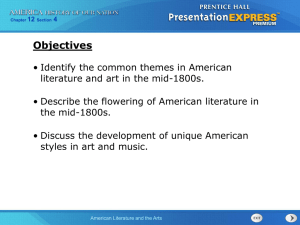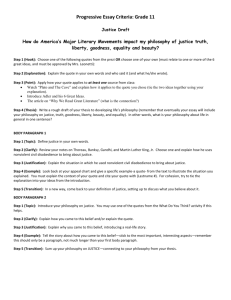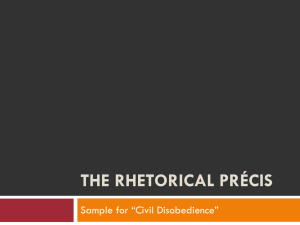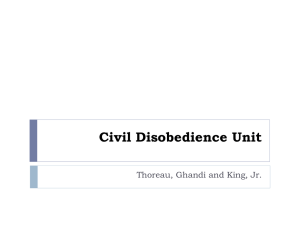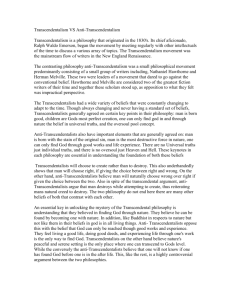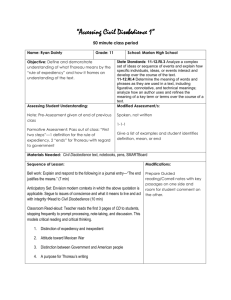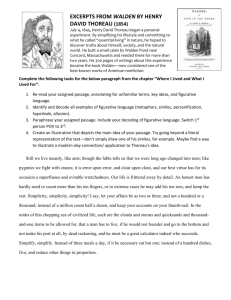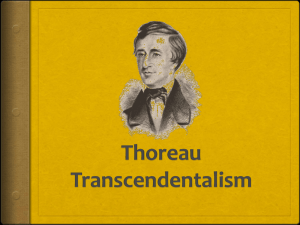Directions: Each passage in this section is followed by a group of
advertisement
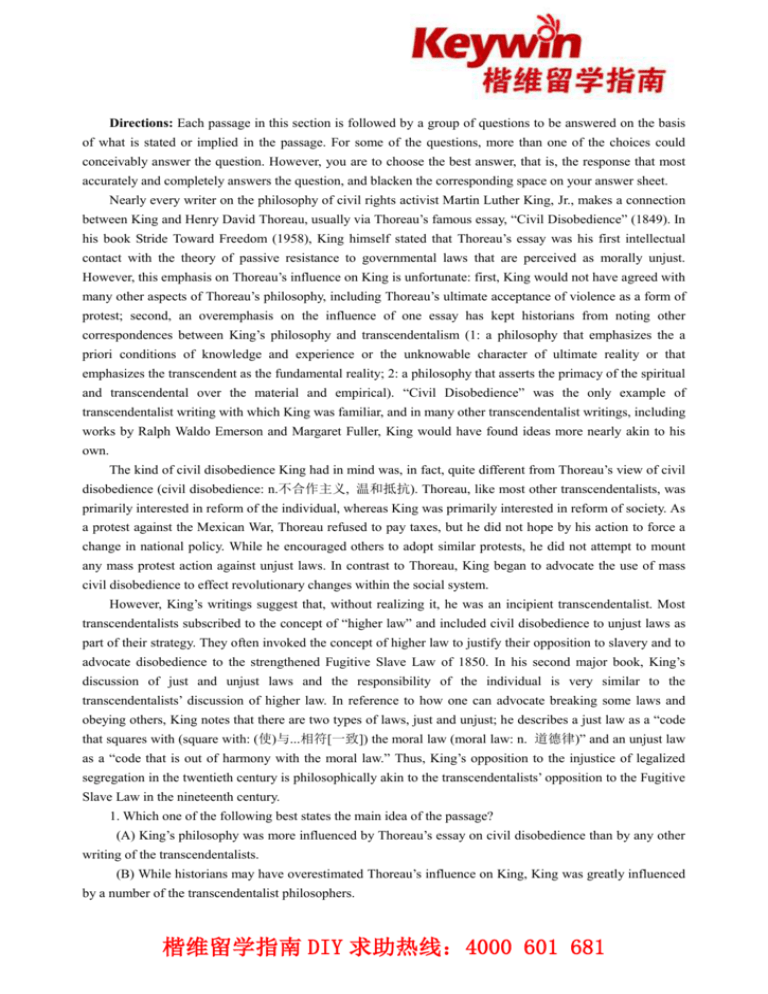
Directions: Each passage in this section is followed by a group of questions to be answered on the basis of what is stated or implied in the passage. For some of the questions, more than one of the choices could conceivably answer the question. However, you are to choose the best answer, that is, the response that most accurately and completely answers the question, and blacken the corresponding space on your answer sheet. Nearly every writer on the philosophy of civil rights activist Martin Luther King, Jr., makes a connection between King and Henry David Thoreau, usually via Thoreau’s famous essay, “Civil Disobedience” (1849). In his book Stride Toward Freedom (1958), King himself stated that Thoreau’s essay was his first intellectual contact with the theory of passive resistance to governmental laws that are perceived as morally unjust. However, this emphasis on Thoreau’s influence on King is unfortunate: first, King would not have agreed with many other aspects of Thoreau’s philosophy, including Thoreau’s ultimate acceptance of violence as a form of protest; second, an overemphasis on the influence of one essay has kept historians from noting other correspondences between King’s philosophy and transcendentalism (1: a philosophy that emphasizes the a priori conditions of knowledge and experience or the unknowable character of ultimate reality or that emphasizes the transcendent as the fundamental reality; 2: a philosophy that asserts the primacy of the spiritual and transcendental over the material and empirical). “Civil Disobedience” was the only example of transcendentalist writing with which King was familiar, and in many other transcendentalist writings, including works by Ralph Waldo Emerson and Margaret Fuller, King would have found ideas more nearly akin to his own. The kind of civil disobedience King had in mind was, in fact, quite different from Thoreau’s view of civil disobedience (civil disobedience: n.不合作主义, 温和抵抗). Thoreau, like most other transcendentalists, was primarily interested in reform of the individual, whereas King was primarily interested in reform of society. As a protest against the Mexican War, Thoreau refused to pay taxes, but he did not hope by his action to force a change in national policy. While he encouraged others to adopt similar protests, he did not attempt to mount any mass protest action against unjust laws. In contrast to Thoreau, King began to advocate the use of mass civil disobedience to effect revolutionary changes within the social system. However, King’s writings suggest that, without realizing it, he was an incipient transcendentalist. Most transcendentalists subscribed to the concept of “higher law” and included civil disobedience to unjust laws as part of their strategy. They often invoked the concept of higher law to justify their opposition to slavery and to advocate disobedience to the strengthened Fugitive Slave Law of 1850. In his second major book, King’s discussion of just and unjust laws and the responsibility of the individual is very similar to the transcendentalists’ discussion of higher law. In reference to how one can advocate breaking some laws and obeying others, King notes that there are two types of laws, just and unjust; he describes a just law as a “code that squares with (square with: (使)与...相符[一致]) the moral law (moral law: n. 道德律)” and an unjust law as a “code that is out of harmony with the moral law.” Thus, King’s opposition to the injustice of legalized segregation in the twentieth century is philosophically akin to the transcendentalists’ opposition to the Fugitive Slave Law in the nineteenth century. 1. Which one of the following best states the main idea of the passage? (A) King’s philosophy was more influenced by Thoreau’s essay on civil disobedience than by any other writing of the transcendentalists. (B) While historians may have overestimated Thoreau’s influence on King, King was greatly influenced by a number of the transcendentalist philosophers. 楷维留学指南 DIY 求助热线:4000 601 681 (C) Thoreau’s and King’s views on civil disobedience differed in that King was more concerned with the social reform than with the economic reform of society. (D) Although historians have overemphasized Thoreau’s influence on King, there are parallels between King’s philosophy and transcendentalism that have not been fully appreciated. (E) King’s ideas about law and civil disobedience were influenced by transcendentalism in general and Thoreau’s essays in particular. 2. Which one of the following statements about “Civil Disobedience” would the author consider most accurate? (A) It was not King’s first contact with the concept of passive resistance to unjust laws. (B) It was one of many examples of transcendentalist writing with which King was familiar. (C) It provided King with a model for using passive resistance to effect social change. (D) It contains a number of ideas with which other transcendentalists strongly disagreed. (E) It influenced King’s philosophy on passive resistance to unjust laws. 3. In the first paragraph, the author is primarily concerned with (A) chronicling the development of King’s philosophy on passive resistance to unjust law (B) suggesting that a common emphasis on one influence on King’s philosophy has been misleading (C) providing new information about the influence of twentieth-century philosophers on King’s work (D) summarizing the work of historians of the most important influences on King’s philosophy (E) providing background information about nineteenth-century transcendentalist philosophers 4. According to the passage, which one of the following is true of’ Emerson and Fuller? (A) Some of their ideas were less typical of transcendentalism than were some of Thoreau’s ideas. (B) They were more concerned with the reform of society than with the reform of the individual. (C) They would have been more likely than Thoreau to agree with King on the necessity of mass protest in civil disobedience. (D) Their ideas about civil disobedience and unjust laws are as well known as Thoreau’s are. (E) Some of their ideas were more similar to King’s than were some of Thoreau’s. 5. According to the passage, King differed from most transcendentalists in that he (A) opposed violence as a form of civil protest (B) opposed war as an instrument of foreign policy under any circumstances (C) believed that just laws had an inherent moral value (D) was more interested in reforming society than in reforming the individual (E) protested social and legal injustice in United States society rather than United States foreign policy 6. The passage suggests which one of the following about Thoreau? (A) He was the first to develop fully the theory of civil disobedience. (B) His work has had a greater influence on contemporary thinkers than has the work of Emerson and Fuller. (C) His philosophy does not contain all of the same elements as the philosophies of the other transcendentalists. (D) He advocated using civil disobedience to force the federal government to change its policies on war. (E) He is better known for his ideas on social and legal reform than for his ideas on individual reform. 7. The passage provides support for which one of the following statements about the quotations in lines 楷维留学指南 DIY 求助热线:4000 601 681 52-55? (A) They are an example of a way in which King’s ideas differed from Thoreau’s but were similar to the ideas of other transcendentalists. (B) They provide evidence that proves that King’s philosophy was affected by transcendentalist thought. (C) They suggest that King, like the transcendentalists, judged human laws by ethical standards. (D) They suggest a theoretical basis for King’s philosophy of government. (E) They provide a paraphrase of Thoreau’s position on just and unjust laws. 答案:DEBEDCC 楷维留学指南 DIY 求助热线:4000 601 681

